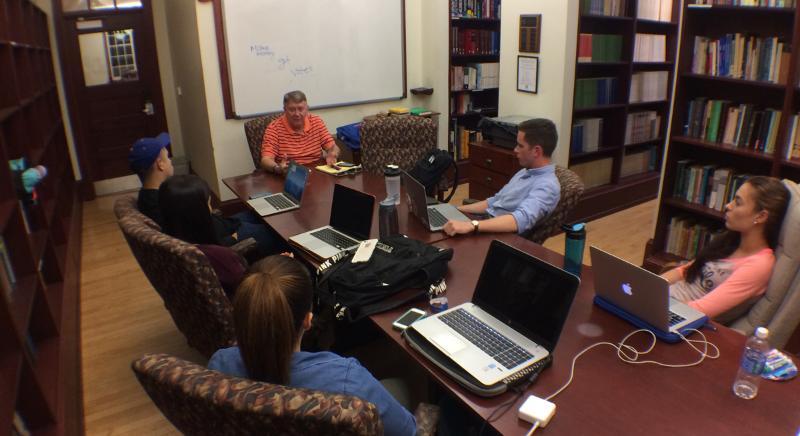
For one group of University of Florida students, the 2016 election holds a special fascination. They’re not just looking at their future president, but their future careers.
Founded in 1985, UF’s master’s program in political campaigning – one of just a handful in the country – prepares tomorrow’s consultants and strategists for jobs in politics and public service. On a Tuesday night not long before the election, five students gathered in the political-science library in Anderson Hall for campaign management class with Roger Austin, an adjunct professor and Gainesville-based political consultant. It’s their first semester in the campaigns program, so Austin’s class gives them an overview of the components of a campaign, from fundraising and budgeting to polling and research.
“Campaigns are both complicated and easy,” Austin says. “They’re very predictable: You announce your candidacy, you run around like a nut raising money, and two months before Election Day when voters start paying attention, you start spending money. It's very simple. But it’s also complex, because of percentage of voters who vote early or absentee instead of on Election Day changes with every successive election.”
Austin, who has taught the class since 2001, shows students what goes on behind the scenes of a campaign. He coaches them on everything from how much of the candidate’s budget to spend on voter contact (70 cents for every dollar) to why candidates in local races don’t need campaign headquarters. (“You want people knocking on doors and working phone banks, not sitting around drinking coffee while they craft your new strategy.”)

Despite their interest in politics, some students like 21-year-old Taryn Boyer have never voted in a presidential election before: They were too young. Students in the program often go on to become campaign managers, consultants and pollsters. Boyer, however, hopes to be on the ballot herself. After law school and military service, she’s planning to run for office, eventually for president. An insider’s perspective on elections has been eye-opening, Boyer said.
“When I see campaign managers doing interviews on CNN or Fox, I can pick up on the strategy now,” she says. “Whatever question they ask, they flip it into the message they want to deliver.”
The Trump and Clinton campaigns have given the class plenty to discuss throughout the semester. But while the events of the 2016 election might seem unprecedented, Austin says he sees more similarities than differences with past years’ contests.
“The shenanigans are different this year due to who the candidates are,” he says, “but every election has that ebb and flow.”